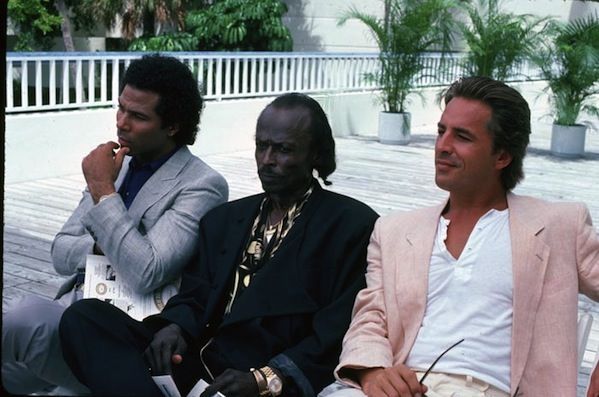For all the neon-Ferrari-and-raw-silk garishness the show now seems to embody, Miami Vice (1984–1990) paid uncommon attention to cultural detail. Music, for instance, didn’t get thrown onto its soundtrack, but carefully selected to reflect both the mid-80s zeitgeist and the aesthetic of a particular episode. Any time you tuned in, you could hear the likes of Devo, Phil Collins, The Tubes, Depeche Mode, or the Alan Parsons project behind the action. Sometimes you could also see musicians onscreen, involved in the action, albeit musicians of a somewhat different kind: the innovative experimental composer and rocker Frank Zappa, for instance, once appeared as “weasel dust” dealer Mario Fuente.
That happened on “Payback,” the nineteenth episode of Miami Vice’s second season which aired on March 14, 1986, a clip of which you can watch at the top of the post. (Naturally, the scene takes place on a boat staffed with armed thugs and bikini girls.) If, after the cliffhanger it ends on, you simply must see the whole thing, you may be able to watch the full episode on Hulu. The same goes for November 8, 1985’s “Junk Love,” another episode from the same season with no less distinguished a musician guest star than Miles Davis.

“The idea is that Crockett and Tubbs arrest the owner of a whorehouse,” writes Dangerous Minds’ Martin Schneider, “a dude named ‘Ivory Jones’ — played by Miles.” And while “most of Davis’ dialogue is semi-incomprehensible… you haven’t lived until you’ve seen the genius behind Bitches Brew croak, ‘Watch that big cabin cruiser, he has a thing about them.’ ” We’ve embedded part of “Junk Love” just below, which, since “Ivory is a scumbag but collaborating with the local constabulary,” offers “plenty of scenes of him hanging out with Crockett and Tubbs.” Add to this Leonard Cohen’s 1986 role as malevolent French secret service agent Francois Zolan, and you realize that Miami Vice has turned out to cater straight to culturally omnivorous 21st century viewers: those who can appreciate Songs of Love and Hate as well as a neon Ferrari, Freak Out! as much as raw silk, and Devo as much as Davis.
Related Content:
Watch Frank Zappa Play Michael Nesmith on The Monkees (1967)
Frank Zappa Debates Censorship on CNN’s Crossfire (1986)
Colin Marshall writes elsewhere on cities, language, Asia, and men’s style. He’s at work on a book about Los Angeles, A Los Angeles Primer, the video series The City in Cinema, and the crowdfunded journalism project Where Is the City of the Future? Follow him on Twitter at @colinmarshall or on Facebook.


The episode with Zappa is one of the best of the series imo. Unfortunately, that cliffhanger is never resolved since he became ill and couldn’t continue acting. That happened a few times on that show.